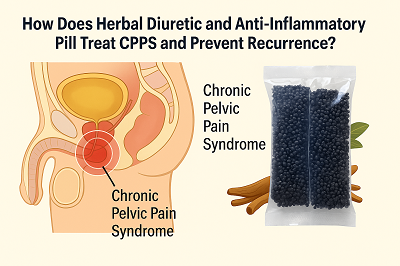How Does Herbal Medicine Diuretic and Anti-Inflammatory Pill Treat CPPS and Prevent Recurrence?
Chronic Pelvic Pain Syndrome (CPPS), often linked to chronic prostatitis (CP/CPPS), is a debilitating condition affecting millions of men, causing persistent pelvic pain, urinary difficulties, and emotional distress. The Herbal Diuretic and Anti-Inflammatory Pill, a traditional Chinese medicine (TCM) formula, offers a natural, holistic approach to managing CPPS symptoms and reducing recurrence. This article explores how this herbal remedy works, its benefits, and strategies to prevent flare-ups, drawing on authoritative insights into CPPS.

Understanding CPPS and Its Challenges
CPPS is characterized by chronic pelvic pain lasting at least three months, often accompanied by urinary symptoms such as frequent urination, urgency, or discomfort during urination. According to the NIDDK, CPPS, a subtype of prostatitis, affects 10-15% of men at some point, with non-bacterial forms comprising 90-95% of cases [1].
Causes may include inflammation, pelvic floor muscle dysfunction, nerve irritation, or stress, making the condition complex and challenging to treat. Conventional treatments like antibiotics are often ineffective for non-bacterial CPPS, and options like alpha-blockers or painkillers may only provide temporary relief, leaving patients prone to recurrent symptoms. This complexity highlights the need for holistic approaches like the Diuretic and Anti-Inflammatory Pill.
How the Herbal Medicine Diuretic and Anti-Inflammatory Pill Works
Diuretic and Anti-Inflammatory Pill is a TCM formula combining over 50 herbs to target CPPS's root causes holistically. Unlike Western medications that focus on isolated symptoms, this herbal blend addresses inflammation, blood circulation, pain, urinary dysfunction, and immune health simultaneously. Below is a detailed explanation of its mechanisms, aligned with CPPS's known pathophysiology:
1. Reducing Inflammation:
Inflammation is a key driver of CPPS, contributing to pelvic pain and tissue irritation [2]. The pill includes Safflower (Carthamus tinctorius), which has anti-inflammatory properties that help reduce swelling in the prostate and pelvic tissues, alleviating discomfort. Angelica Sinensis (Danggui) further modulates immune responses, soothing irritated areas and addressing inflammatory triggers noted by the Mayo Clinic, such as immune system dysfunction [2].
2. Improving Blood Circulation:
Poor blood flow, or blood stasis in TCM, exacerbates pelvic pain and delays healing. Peach Kernel (Persicae Semen) and Radix Paeoniae Rubra (Red Peony Root) promote circulation, preventing stagnation that worsens inflammation. Enhanced blood flow delivers oxygen and nutrients to affected tissues, facilitating repair and reducing symptom severity. This aligns with research indicating that pelvic congestion may contribute to CPPS symptoms [3].
3. Relieving Pain and Muscle Tension:
CPPS often involves pelvic floor muscle spasms or neuropathic pain, causing discomfort in the pelvis, perineum, or lower abdomen. Houttuynia Cordata, with analgesic and antispasmodic properties, relaxes pelvic muscles and eases nerve-related pain. Corydalis Yanhusuo contains alkaloids that modulate pain pathways, addressing both muscular and sharp, radiating pain to provide comprehensive relief.
4. Enhancing Urinary Function:
Urinary symptoms, such as urgency, frequency, or painful urination, are prevalent in CPPS [1]. Plantain Seed (Plantago asiatica) and Talcum act as natural diuretics, clearing excess heat and dampness from the urinary tract per TCM principles. These herbs reduce bladder irritation and improve urine flow, alleviating symptoms like hesitant urination.
5. Preventing Recurrence:
Recurrence is a major challenge in CPPS, as conventional treatments often fail to address underlying factors like inflammation or muscle dysfunction [3]. The Diuretic and Anti-Inflammatory Pill strengthens pelvic and immune health by resolving inflammation, improving circulation, and balancing the body's internal environment. Unlike antibiotics, which are ineffective for non-bacterial CPPS [1], this formula's multi-targeted approach reduces flare-up frequency and severity, offering sustained relief.
Benefits of the Herbal Approach
The Diuretic and Anti-Inflammatory Pill offers several advantages over conventional CPPS treatments, making it a compelling option for those seeking natural solutions:
Natural and Low-Risk: Composed entirely of herbs, the formula avoids side effects associated with long-term antibiotic use (e.g., digestive issues, antibiotic resistance) or painkillers (e.g., liver strain), which are common concerns in CPPS management [1].
Comprehensive Symptom Relief: By targeting pain, inflammation, urinary issues, and muscle tension simultaneously, it addresses CPPS's multifaceted nature, unlike single-target medications that may only mask symptoms.
Reduced Recurrence Risk: The pill's focus on resolving inflammation, blood stasis, and immune imbalances helps prevent flare-ups, offering longer-term stability compared to symptom-focused treatments [3].
Personalized Treatment: TCM practitioners can tailor the formula to individual symptoms, such as prioritizing urinary dysfunction or pain relief, ensuring customized care.
Holistic Wellness: Beyond CPPS, the formula promotes overall pelvic and urinary health, enhancing quality of life. Patients are encouraged to complement treatment with lifestyle changes to maximize benefits.
Preventing CPPS Recurrence
To enhance the pill's effectiveness and minimize recurrence, patients should adopt supportive lifestyle changes, as stress and lifestyle factors can exacerbate CPPS [2]:
Dietary Adjustments: Avoid bladder irritants like caffeine, spicy foods, or alcohol, which can worsen urinary symptoms. A diet rich in anti-inflammatory foods, such as leafy greens or berries, supports the pill’s effects.
Physical Activity: Pelvic floor exercises, yoga, or gentle stretching reduce muscle tension and improve circulation, complementing the formula’s circulatory benefits.
Stress Management: Stress is a known CPPS trigger [2]. Practices like mindfulness, meditation, or deep breathing can mitigate flare-ups.
Regular Monitoring: Follow-up consultations with a healthcare provider or TCM practitioner ensure ongoing symptom control and allow for formula adjustments as needed.
Conclusion
Herbal medicine Diuretic and Anti-Inflammatory Pill provides a natural, holistic solution for managing CPPS and preventing recurrence. By reducing inflammation, improving blood circulation, relieving pain, enhancing urinary function, and addressing root causes, it tackles CPPS's complexity effectively. Drawing on authoritative insights into CPPS's pathophysiology, this TCM formula offers a safe, comprehensive alternative to conventional treatments. With proper use and lifestyle adjustments, it empowers CPPS sufferers to achieve lasting relief and improved quality of life.
References
[1] National Institute of Diabetes and Digestive and Kidney Diseases (NIDDK). Prostatitis: Inflammation of the Prostate. https://www.niddk.nih.gov/health-information/urologic-diseases/prostate-problems/prostatitis-inflammation-prostate
[2] Mayo Clinic. Chronic Pelvic Pain in Men. https://www.mayoclinic.org/diseases-conditions/chronic-pelvic-pain/symptoms-causes/syc-20354368
[3] Doiron RC, Nickel JC. Management of chronic prostatitis/chronic pelvic pain syndrome. https://pmc.ncbi.nlm.nih.gov/articles/PMC6040620/



